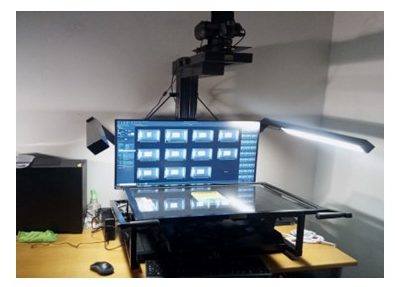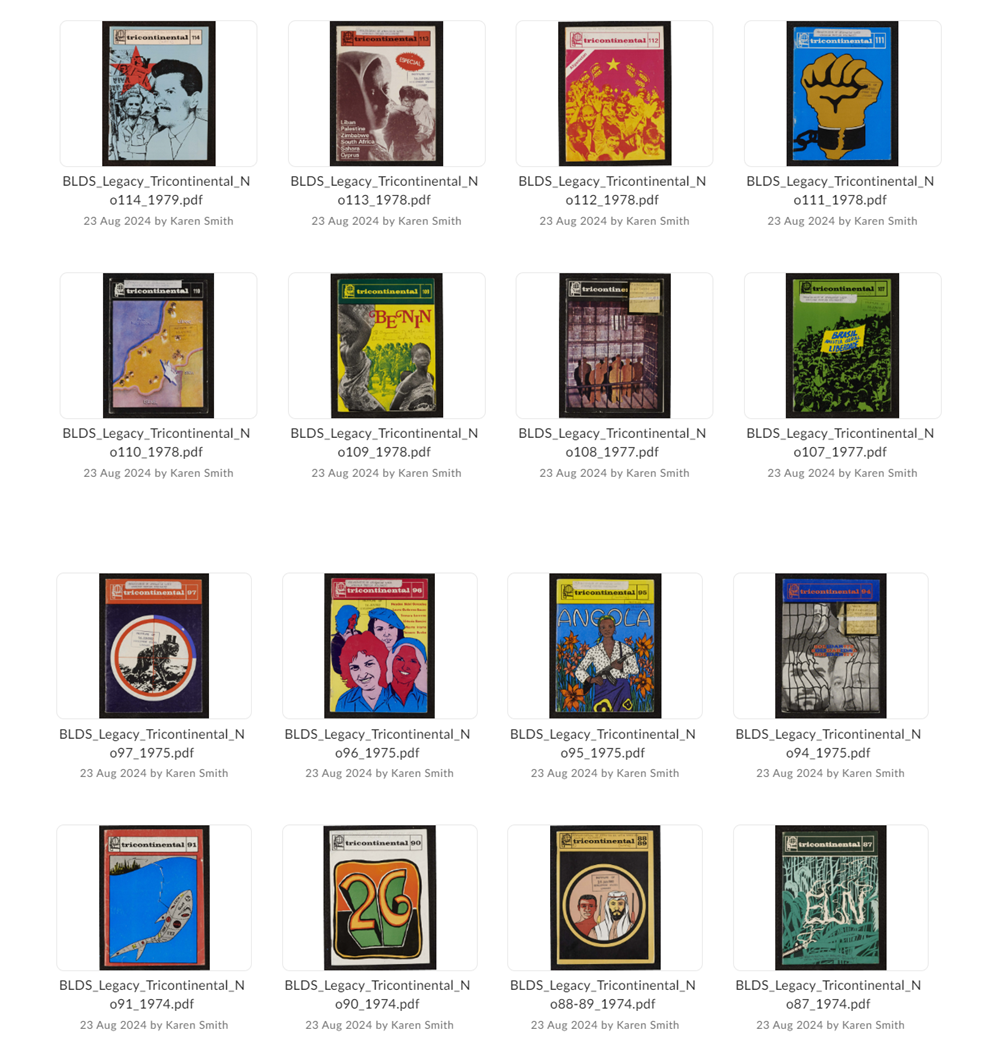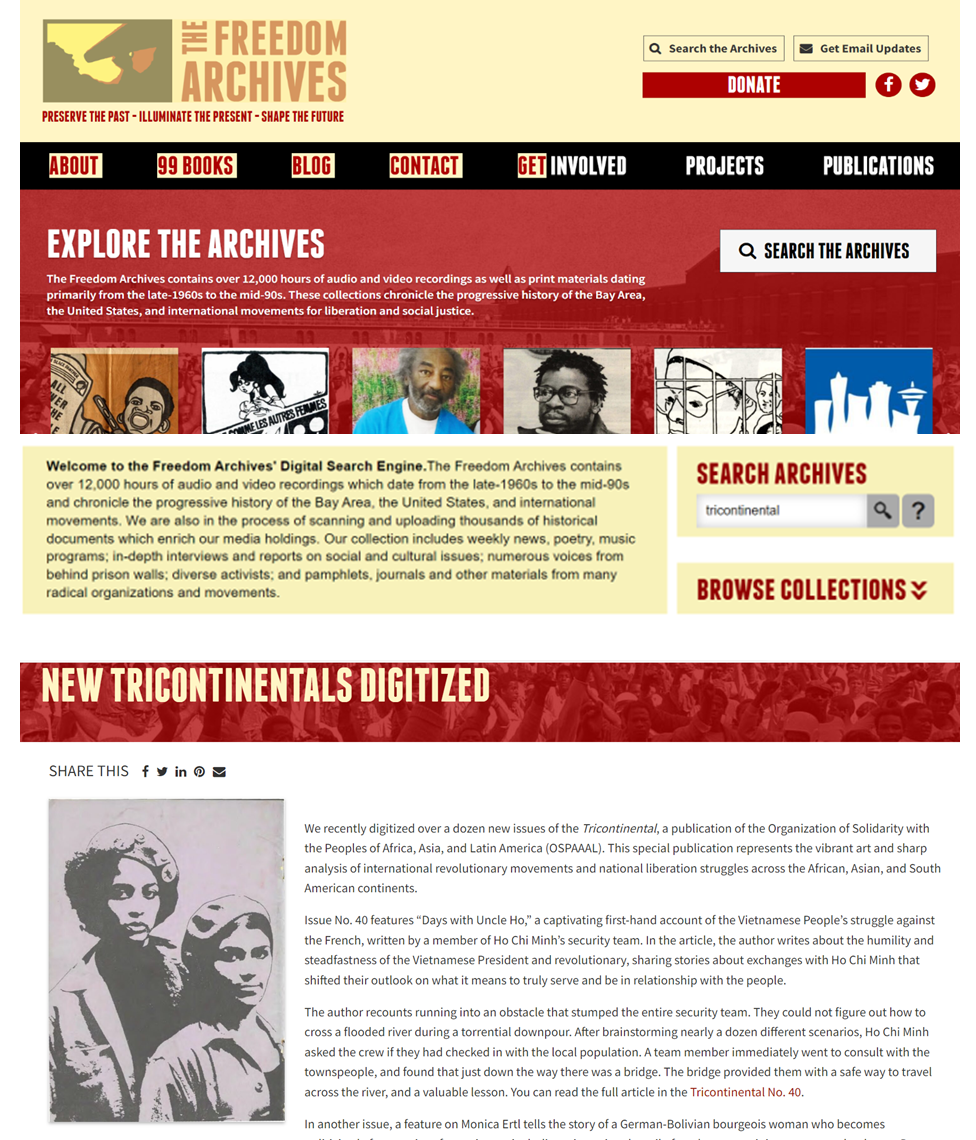8 Globalising revolution: Digitising Tricontinental journal 1967–2019
Karen Smith
This chapter describes the project to digitise all holdings of Tricontinental journal held at the University of Sussex as part of the British Library for Development Studies Legacy collection. We’ll look at the resources and processes involved, sample the results, and explore collaboration with colleagues inside and beyond the university to widen access to the journal and diversify modes of engagement with its content.
In being transparent about the library’s work, we hope to help centre students in the pedagogical process and generate new ideas and debate about ways in which this activity relates to their specific interests and development. Positioning the journal as a lens through which to view the socio-historical moment it emerges from, it is hoped that the act of digitisation will offer alternative ways to frame wider ethical and socio-political issues, and to consider ways in which new technologies might intersect with these.
The process
Digitisation of all 174 issues of the journal was completed in September 2024.
The project was funded by the Education & Innovation Fund of the School of Global Studies, University of Sussex, and was conducted on site in the Library with specialist equipment including a custom-built rig and professional quality camera and software. It took approximately five working weeks, with one dedicated staff member capturing over 7000 images.

Hardware: overhead Nikon D850 camera calibrated by professional photographer + custom-built rig with glass platen + 8 TB external hard drive for transfer to cloud-based Digital Asset Management platform.
Software: Capture One professional photography suite, Adobe Acrobat for PDF creation & OCR scanning, Python for creating scripts for part-automation of file conversion.
The task required careful planning, taking into account the intended use of the digitised material, a survey or inventory of the issues to be scanned, anticipated obstacles to high-quality image capture, file format naming conventions, data backup and storage, verification of data integrity on transfer, and an estimation of costs & timeline.
Where capture of the entire text on a page was compromised, due to the binding of the material or other physical limitations, preservation of the printed item was treated as a priority over maximal capture. The intention was to subject it to nothing more demanding than ‘normal’ manual handling expected in the course of library consultation. This accords with the principle that the digital surrogate does not supersede the value of the original item, nor alter the need for retention and conservation of that item.
The process
Image capture |
File naming |
PDF conversion |
Upload to Cloud |
Recording |
(TIF files) |
File transfer |
OCR scanning |
DAM system |
& checking |
The results
The act of gathering digitised copies conveys the distinctive aesthetic of the journal at a glance:


Copyright and sensitivity triage
Before embarking on the digitisation process, the material selected must be thoroughly assessed. Beyond practicalities such as the physical condition of the material (will it be unduly damaged by the process?) and the limitations of financial and staff resources, it is necessary to consider copyright law, data protection and sensitivity implications arising from providing digital access. Tricontinental is a periodical with multiple authors, originating in the late 1960s, and as such will still be subject to the UK Copyright, Designs and Patents Act 1988.
Tricontinental is an unusual case, as its revolutionary roots gave rise to an unusually liberal waiver of conventional copyright restrictions (see chapter by Alice Corble in this volume). It was published by the Organization of Solidarity with the Peoples of Africa, Asia, and Latin America (OSPAAAL), which closed in 2019. However, prior to commencing our digitisation project, we spoke at length with The Freedom Archives, a non-profit organisation based in Berkeley, California, which had previously digitised Tricontinental material, and which had been in communication with OSPAAAL staff both prior to and post its demise. We undertook to follow the same approach as The Freedom Archives: namely, to honour the spirit of the Tricontinental artists, by making sure than these scans are freely available for personal research purposes, but not presented in such a way that high resolution images could be harvested en masse and potentially used for commercial gain.
UK law requires permission be sought before reproducing or make publicly available any work in copyright. Within this, exemption under the concept of ‘fair dealing’ is provided, particularly for non-commercial purposes such as research and private study. In an increasingly dynamic world of digital information dissemination, however, online publication may require more careful observation on this point. If ‘fair dealing’ falls short of covering the intended use, reasonable steps must be taken to identify the copyright holder (the publisher, author or their estate), which will typically involve consulting a database such as The WATCH File: Writers, Artists and Their Copyright Holders. Once identified, details of the intended digitisation and publication can be discussed with the copyright holder and the terms negotiated such as fees and conditions.
Sensitivity triage should also be conducted, as the periodicals very likely will reference living individuals who may be identified through the context of the subject matter. Associated legalities to consider include the UK’s data protection legislation, ensuring any personal data is handled lawfully, transparently and securely. Consent to disclose this data must be obtained from the individual where possible. This is even more imperative in the context of a politically potent publication such as Tricontinental. Ethical practice recommends an appreciation of potential biases carried by the work, and measures to avoid perpetuating these throughout the digitisation life cycle.
Global issues
As part of the project, we also conducted a survey of global library holdings of the journal. Although incomplete due to limited resources, this offers an unprecedented and illuminating snapshot of the wide but uneven distribution of copies. The British Library for Development Studies Legacy Collection holdings are amongst the most comprehensive in the world.
Using pre-existing information professional networks, we also discovered some uncatalogued copies of the journal in the UK. This allowed us to collaborate with the institution to enhance the digital archive by filling gaps in the issues available. Fostering working relationships in this way also helps preserve the ethical and political spirit of the journal, ensuring the way we organise access is respectful of those whose histories it represents and reflective of the transnational solidarity it embodies.
Enhancements with AI
Working with colleagues in the library’s Digital Development team, we harnessed the power of AI to create scripts for part-automation of the digitisation process and to check data and image quality. Running a script in Python 3.11, we targeted unprocessed raw images and converted them into PDFs, and then scanned them for Optical Character Recognition (OCR) in batches within Adobe Acrobat. For refinement and troubleshooting of the script, we used Microsoft CoPilot (the university’s preferred AI tool, as it is bounded). Similarly, Python allowed us to create a checksum – a script generating a code that can be used to verify that the image data has not been inadvertently altered or corrupted during transfer from different storage drives and platforms.
These OCR’d texts have been used for further investigations detailed in this publication (see chapters by Jonathan Blaney and Marty Steer in this volume) and in addition formed the basis for developing project in collaboration with the Sussex Digital Humanities Lab, Cambridge Digital Humanities and Nelson Mandela University entitled ‘AI and the Tricontinental Revolution – applying machine learning and minimal computing approaches to Global South library collections’. This project builds on our earlier work with a novel focus on resource-constrained institutions, aiming to bridge the gap between Machine Learning (ML) with Minimal Computing (MC) strategies. Centred on the Tricontinental collection, it aims to develop and test a suite of ML/MC techniques aligned with the needs of Global South researchers.
Collaboration
Creating a high-quality digital archive calls for collaboration, and from the beginning of this project we established an alliance with The Freedom Archives in Berkeley, California. Sharing our digitised issues will help them to establish the most comprehensive online archive of Tricontinental journal in the world.

Here at the University of Sussex, we plan to establish an online platform through which to make the digital copies and accompanying resources accessible, and to build a network of academics and information professionals to promote engagement by students and scholars in the Global South. Holding in mind from the beginning potential audiences and anticipating the possibilities for future use of the digitised material will serve as a compass for shaping efficient procedures and clarifying decisions throughout the process. Similarly, early assessment of how the preservation, management and maintenance of data in the long-term might be achieved will pay dividends.
Online publication and long-term sustainability
Digitisation is not complete without an eye to likely future adaptations necessary to preserve resources and access. Selecting enduring and widely compatible file formats, performing regular backups and migrating to evolving storage technologies will safeguard minimise loss of data. The benefits of making resources available to a global audience are optimised through user-friendly platforms and compliance with accessibility standards. Environmentally and financially responsible choices and creative solutions that curb the costs of technology required for long-term preservation will also be key considerations. And of course, without accurate descriptive metadata that functions to effectively enhance discoverability and accessibility of these digital resources by individuals that may not be aware they exist, they may as well be invisible.
Terms of use
As part of the digitisation process, it is important to establish the terms of use for the material. These should carefully balance accessibility, respect for the communities of origin referenced, and the rights of the holding institution or copyright holder. Points to consider would include:
Acknowledgment of Communities of Origin: Using terms that recognize and respect the cultural and historical significance of the digitised works to the communities they represent. This could involve requiring users to credit the communities in any derivative works.
Example: ‘Users must acknowledge the Tricontinental periodicals as a resource of historical and cultural significance, crediting the Organization of Solidarity with the Peoples of Africa, Asia, and Latin America (OSPAAAL) and any other relevant contributors.’
Non-commercial use and attribution: It may be necessary to specify that the digitised periodicals are intended for educational and research purposes, prohibiting commercial exploitation without explicit permission, and to provide proper attribution to the holding institution and any authors or contributors when using the content.
Example: ‘The digitised materials are to be used solely for educational, research, and personal purposes. Commercial use is strictly prohibited without prior written consent from the copyright holder. Any use of the materials must include proper attribution, such as citing the source and acknowledging the holding institution or copyright holder.’
Copyright compliance: A clear outline of the copyright status of the works. If copyright is held by the institution, include terms that protect its rights while allowing fair use. If the copyright has expired, consider marking the content as public domain.
Access restrictions: Depending on the sensitivity of the content, you might include restrictions on who can access the digitised materials (e.g., requiring registration or limiting access to certain regions), with clear guidance on how to request access.
Preservation of integrity: Prohibit alterations to the digitised content that could misrepresent its original form or meaning or threaten their ongoing accessibility.
Example: ‘Users are not allowed to modify, distort, or misrepresent the content in any way that could compromise its integrity or original meaning. Users must not attempt to download or redistribute the digitised files in a way that could compromise their preservation or accessibility.’
Community Engagement: Encourage users to engage with the communities of origin in meaningful ways, communicating insights in socially responsible ways that foster progressive activity.
Example: ‘Users are encouraged to engage with the communities of origin by sharing research findings or supporting initiatives that align with the values of the periodicals.’
Discussion points
This chapter has described the process of digitising this particular collection, which we hope will be useful both in terms of delineating some of the issues and workflows involved, but also in provoking some questions about digitisation more broadly. We thought we’d include a few of these as the basis for further discussion and as helpful prompts prior to starting your own digitisation projects!
- In what ways does the creation of digital surrogates of the physical copies change or enhance your understanding and appreciation of the journal?
- You are a member of the community in a Global South country represented in the journal’s coverage. What might be the benefits and risks to you, on receiving access to this resource?
- In principle, the digitisation of Tricontinental journal is an action in the spirit of the revolution and liberation it espouses. To what extent might the digital divide and existing socio-political inequalities hinder realisation of its potentially empowering impact?
- The journals contain highly graphic and emotive images and descriptions of violence and abuse of human rights. Is there anything information professionals specifically need to do in order to provide access in a responsible, ethical manner?
- In its Decolonisation Statement, the University of Sussex Library states: ‘The library’s activities are rooted in systems of inequality built upon the racist legacies of imperialism.’ How far might these legacies and roots shape the provision of digital access to an anti-capitalist, anti-imperialist organ such as Tricontinental? What would it take to minimise this influence?
Many thanks to Danny Millum, Duncan Harrison, Kevin Bacon and all the other colleagues involved in this project.


